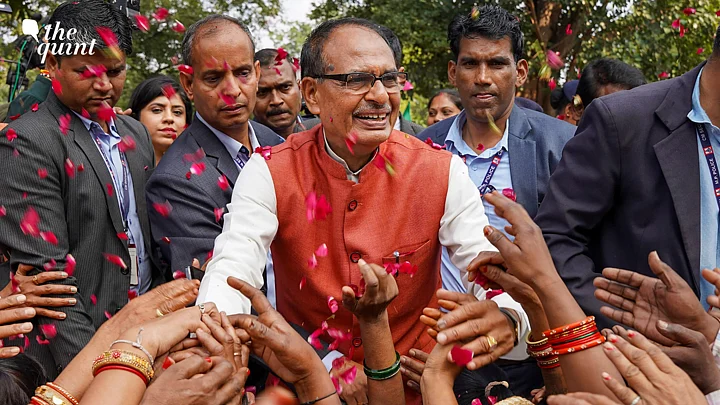On Sunday, 3 December, as the results of the four states that went to elections in November this year were declared, analysts across the board credited the victories to women and the Bharatiya Janata Party and Congress’ welfare schemes for women in different states.
Were women really the kingmakers in the Assembly elections? How did women vote in Rajasthan, Madhya Pradesh, Telangana, and Chhattisgarh? The Quint asked experts.
‘Key Contributor, But Not Kingmakers Alone’
Tara Krishnaswamy, political commentator and co-founder of Political Shakti, tells The Quint, “We can’t say that women were the kingmakers alone, they were a key factor. There were many issues and demographics that drove the elections, for instance anti-incumbency in Telangana, Rajasthan, and Chhattisgarh.”
Yashwant Deshmukh, founder editor of CVoter, says,
“Women have been decisively voting in elections for decades now. Data clearly suggests that they vote on the real issues of governance, the practical things that matter. And why won’t women vote for something that helps improve their economic freedom, or economic conditions even?”
What do the numbers show? In Telangana, in 56 out of 119 constituencies, the turnout of women voters was more than their male counterparts. In 37 of these seats, the Congress won.
In Rajasthan and Chhattisgarh too, the turnout of women voters was more. The number of women voting for the BJP went up too, Krishnaswamy says.
In Madhya Pradesh, the voter turnout for women increased by two percent as compared to the 2018 elections, and the vote share of the BJP went up too.
So What Worked For The Parties?
In a jist, welfare schemes for women. Just a few months before the polls, when anti-incumbency was at its peak in Madhya Pradesh, Shivraj Singh Chouhan announced the Ladli Behna Yojana.
Under this scheme, he promised a cash transfer of Rs 1,200 to 1,25,00,000 women of MP between the ages of 23-60.
Since the scheme was announced on 6 March to when the state went to polls, bank accounts of over a crore women were opened for the implementation of this scheme.
“This (Ladli Behna scheme) decreased the amount of anger towards the government significantly. To my knowledge, women did not vote more than men for the Shivraj government. But they did not vote against him either, which was the scenario a few months ago.”Tara Krishnaswamy
The same happened for the Congress in Telangana. Under the Mahalakshmi scheme, they promised financial assistance and free bus service for women.
Krishnaswamy says that women voters tend to vote on delivered benefits rather than just promises.
“They saw this being delivered in Karnataka. The trust factor drove them to vote for the Congress in Telangana,” says she.
In Chhattisgarh, just days before the voting, the BJP announced an yearly financial assistance of Rs 12,000 to married women and promised to provide gas cylinders to poor families for Rs 500.
But if this is the premise, then what went wrong for the Congress in Rajasthan? Advertising that was not powerful enough, believes Krishnaswamy.
She explains to The Quint, “In Rajasthan, the central schemes were touted as ‘Modi’s guarantees’. Ashok Gehlot had launched a lot of good schemes for women – like the pension for widows, old, or destitute women – but they were not marketed or branded properly and people ended up thinking that they were the central government’s schemes.”
Deshmukh doesn’t agree, however. He says,
“Rajasthan and Chhattisgarh were pure anti-incumbency in unique ways. The Congress’ vote share didn’t go down. It was in-fighting, rebel factors, and lack of organisational strength for the Congress that caused its loss.”
‘Bring Women in Power Too Now’
With women increasingly asserting their electoral power, analysts say that it’s time we get to see them in power too.
Krishnaswamy says, “It’s high time that political parties not only think about schemes and governance for women, but actively make efforts to include them in governance. Give tickets to women, make sure there’s power sharing happening with women, that’s the next step needed.”
Deshmukh nods. He tells The Quint,
“Imagine if women can influence elections so much just by their electoral participation and voting, imagine their influence when they become leaders and occupy one-third of the seats. That would be real empowerment.”
